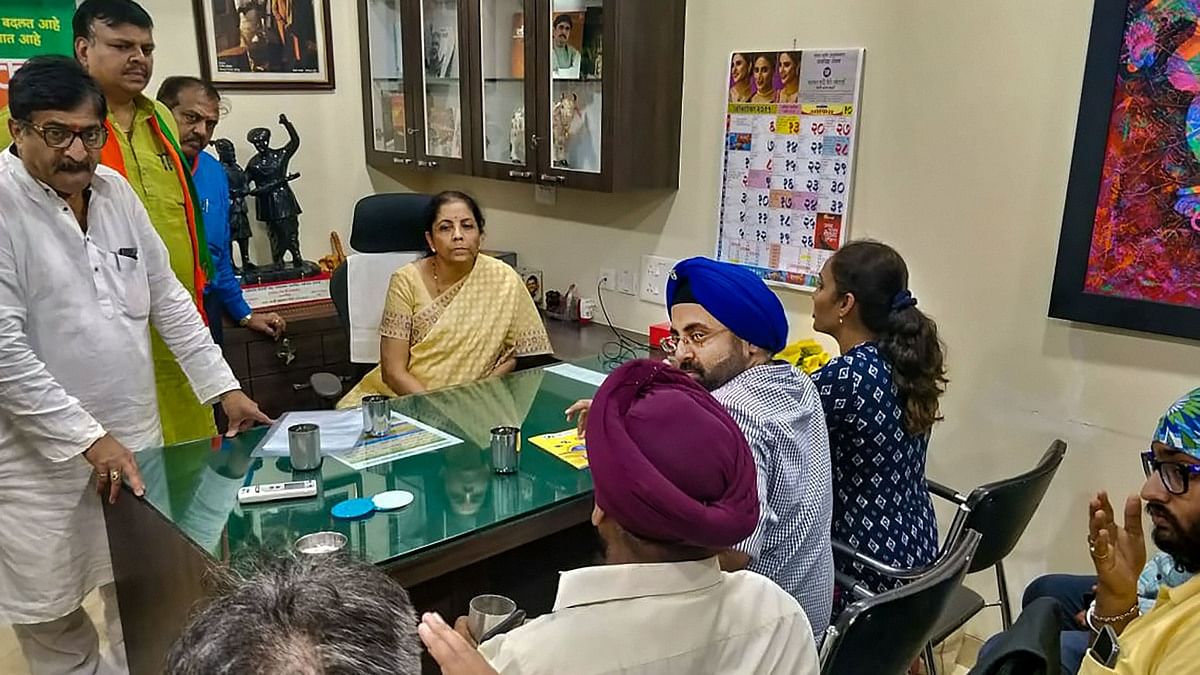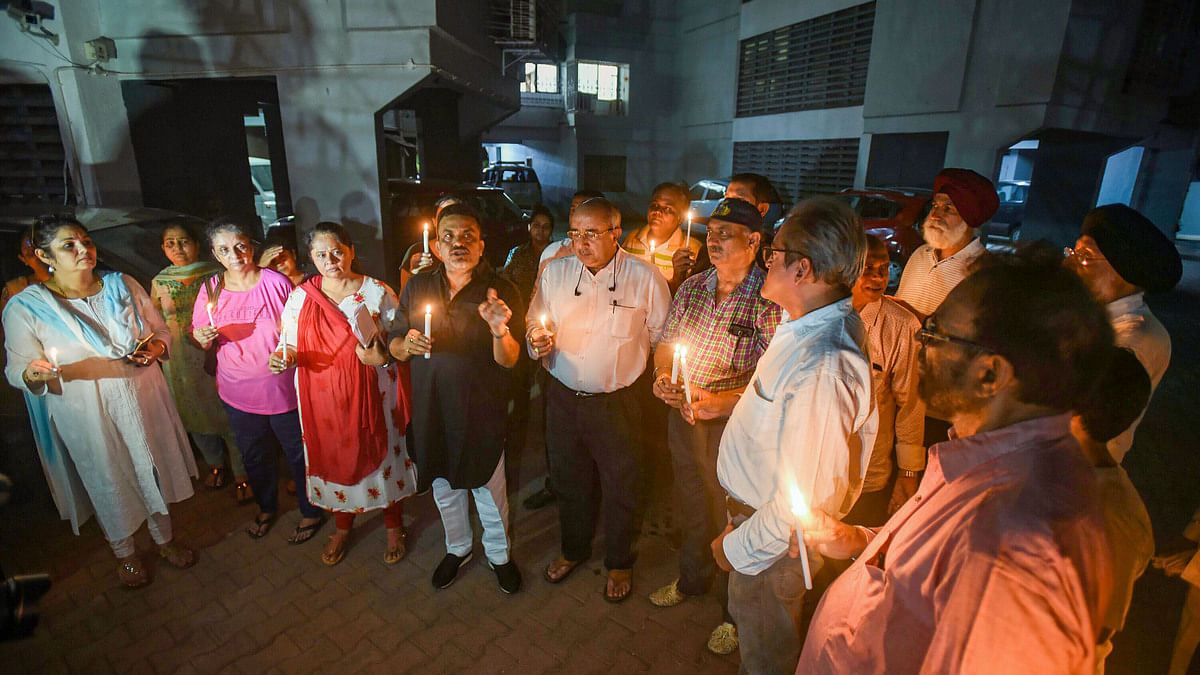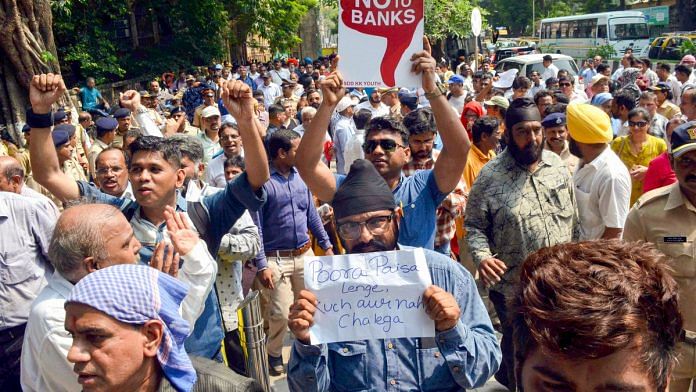It is the 550th birth anniversary year of Guru Nanak, a time for celebration and thanksgiving. But ever since the Punjab & Maharashtra Co-operative Bank collapsed on 24 September, India’s Sikh community, which made up the largest chunk of its 16 lakh customers, has lost its mojo.
Today, as the Punjab & Maharashtra Co-operative Bank (PMC) is defrauded by Housing Development & Infrastructure Ltd of nearly Rs 6,500 crore – over 70 per cent of its total assets – scores of senior citizens who had put their life-savings into it, small and middle-level businesses, and nearly 17,000 co-operative societies are traumatised.
But the Sikh community in Mumbai is especially facing a debilitating loss that is not just financial but also deeply emotional.
For them, the PMC Bank bust is almost an act of betrayal against their faith. After all, so much of their family income and community funds are deposited in the bank.
Also read: PMC fiasco shows why it’s time to pull the plug on urban cooperative banks
A ‘Second Partition’ for Sikhs
The scam-ridden PMC Bank had opened for business in a 240 square feet-room in the suburb of Sion in South Central Mumbai in 1984. At that time, it was a beacon of hope for the residents of Guru Tegh Bahadur Nagar, a colony of Sikh and Punjabi refugees who fled Pakistan after Independence. The early migrants set up small eateries, ran taxis on the roads of Mumbai, but as ‘outsiders’, they found it difficult to raise loans from commercial banks.
“As the population of Sikhs in Mumbai began to expand, there was a corresponding demand for our own bank, similar to the Saraswat Co-operative Bank,” says Ram Singh Rathor who makes bullet-proof cars for VIPs and is the president of the United Singh Sabha Foundation.
The Saraswat Co-operative Bank is the country’s largest urban co-operative bank – or UCB – and was set up in 1918 to address the financial needs of the Saraswat community in Maharashtra. “By the 1980s, the co-operative movement in the state had also become very robust, and PMC was able to ride the wave with great success,” says Rathor.
The United Singh Sabha Foundation was set up earlier this year in Mumbai to bring gurdwaras across India under one umbrella organisation. Its members alone have deposits of nearly Rs 50 crore in the PMC Bank.
“Wherever a new branch of PMC was launched, officials would approach the local gurdwara and ask them to show their loyalty to the community by associating with the bank. It was an emotional strategy which worked well, but now their accounts are frozen. This will not only impact the day-to-day running of the gurdwaras, but more critically the vast network of schools, hospitals, colleges and other institutions operated by them,” claims Ram Singh Rathor.
The Guru Gobind Singh Foundation in Nashik runs three educational institutions with a staff of nearly 400 – their salary alone adds up to Rs 1 crore every month. “The fee collected from the students is put into the monthly fixed deposits, and the interest is used in running our school, engineering college and polytechnic. But after restrictions were imposed on the PMC Bank, our cash flow has stopped overnight and we don’t know how to keep them running,” says a worried Permindur Singh, the foundation’s CEO.
“A few members of the management committee have mortgaged their personal property to raise funds in the short term,” he adds. The foundation, which was set up by prominent Sikhs of Nashik in 1978 and has nearly Rs 6 crore locked up in the bank, has put itself on notice. “If we are unable to pay our teachers, they will quit and it will affect not only our admissions for 2020, but our very existence,” says Singh.
“Inhone sangat ka paisa khaya hai (they have looted the believers),” says Raja Singh Johar, a Chembur-based railway contractor, who banked with the stressed lender just like his father did, a refugee from Rawalpindi in Pakistan. “My father lost everything during the Partition in 1947. When PMC started operations in February 1984, former Prime Minister Manmohan Singh was the RBI governor and it gave him a sense of security. But now many families are experiencing the same sinking feeling all over again, a second Partition, and this time the enemy is one of our own,” says Johar.
All the eight Sikhs on the PMC Bank board have been stripped off their memberships of gurdwaras and community-run trusts in Mumbai and Navi Mumbai.

No car, no pharmacy
The Housing Development & Infrastructure Ltd that defrauded PMC is a firm of slum developers. But it is owned by the politically well-connected Wadhawan family, known in Mumbai for their bring-on-the-bling lifestyle. The Enforcement Directorate has seized two private jets and 15 super luxury cars from their homes following the PMC’s crash.
But even the powerful and the resourceful have lost their money.
Such was the lure of the PMC during its dream-run that even the Reserve Bank Officers’ Co-operative Credit Society Ltd has a fixed deposit worth Rs 105 crore. Minister of State for Housing in Maharashtra, Ravindra Waikar of the Shiv Sena who runs two private clubs Matoshree and Supremo in the western suburb of Jogeshwari, is also believed to have been scammed out of several crores by the bank.
Ranjeet Singh, a board member of the PMC Bank, is the son of four-time BJP MLA from Mulund Tara Singh and an active member of the party.
Although PMC has 137 branches spread across six states, nearly half of them are in Thane district and in Mumbai. Its head office is located in the north eastern suburb of Bhandup in a building ironically called ‘Dreams Mall’, developed by Housing Development Infrastructure Ltd (HDIL), the company which has bamboozled PMC.
“It’s a cruel twist of fate, and the joke is on us,” says Manas Iyer, a young IT professional who was saving up to buy his first car. While he has been going toxic on social media, others have been fast-tracking their protest on the streets – home-makers, traders, pensioners and professors.
“We have seen in the past that whenever a co-operative bank folded up, the depositors had to struggle for several years to recover even a fraction of their money. We never thought we would be gypped; after all, the PMC Bank was one of the top 10 urban co-operative banks in the country,” says Anil Pendse, a chemist who runs a pharmacy in the semi-industrial suburb of Mulund.
The bank showed a profit of nearly Rs 100 crore in the year ending 31 March 2019, and declared a dividend of 11 per cent. (Source: PMC Bank, 36th Annual Report, 2018-19)
“So, there was no guessing how deep the rot was,” says Pendse. “My customers are mostly daily-wagers who can only afford to buy medicines on credit. Now, they will have to go elsewhere, which could mean the end of the road for my shop,” he adds.
Also read: Two HDIL directors arrested in PMC Bank scam, property worth Rs 3,500 crore frozen
No lessons learnt
In a written confession, PMC’s suspended managing director Joy Thomas reveals that the relationship between the promoters of HDIL and the founders of the troubled lender was cemented in the mid-1980s when Rajesh Kumar Wadhawan infused capital into the bank during a financial crisis.
By 2005, nearly 60 per cent of all its transactions were linked to the realty group. PMC Bank’s former chairman Waryam Singh was on the HDIL Board for nine years and held a 1.91 per cent stake in the firm; the Wadhawans have also served on the bank’s Board.
PMC charged HDIL an interest of 18-24 per cent and continued making a healthy profit till the tide turned for the housing firm in 2012-13 after the Mumbai International Airport Pvt Ltd (MIAL) cancelled the slum rehabilitation project near the airport because it could not be completed on time.
HDIL began to default on its dues and in early September this year, it was declared insolvent. But PMC did not report its HDIL exposure to the public, fearing that any disclosure about non-performing assets would harm its reputation and take it down.
This is exactly what happened.
There are 1,542 urban co-operative (UCBs) and 96,606 rural co-operative banks spread across India, which account for 8 per cent of deposits and 9 per cent of advances and loans. As of March 2019, 26 UCBs were placed under restrictions by the RBI for putting depositors at risk. PMC Bank is the largest offender since 2001 when Ahmedabad-based Madhavpura Mercantile Cooperative Bank was brought down by its dubious lending of over Rs 800 crore to tainted stock broker Ketan Parekh.
“We have been telling people not to keep their money with cooperative banks, except to the extent of Rs 1 lakh, which is covered by insurance,” says Sucheta Dalal, journalist and trustee of Moneylife Foundation, a not-for-profit organisation engaged in spreading financial literacy.
“The failure of one of the biggest co-operative banks, despite its high reputation for customer service and sharp focus on computerisation and digitisation, only underlines what we have been saying. Unfortunately, most depositors fail to understand the serious implications of poor regulatory accountability in India. The PMC Bank was able to hoodwink its auditors and regulators for almost seven years,” she says.
The Mumbai Police has arrested the promoters of HDIL, Rakesh and Sarang Wadhawan, as well as former chairman of PMC Waryam Singh. But, for lakhs of people who deposited their life savings into the bank, the fight has just begun.
Also read: A Saradha-like ‘scam’ unfolds in Rajasthan – 1.5 lakh investors ‘duped’ of Rs 953 cr
Why PMC attracted customers
Seventy five-year-old Jaspal Kaur Mehta has been a loyal customer of the PMC Bank since its inception. “At the time, I felt a sense of pride and ownership because the founders belonged to my community, but even after it expanded, the bank never abandoned its human touch. And as I grew older, lost my husband and son, and started living alone, these things counted a lot more. Even today, in the midst of all the chaos, the bank staff is doing their best to help,” says Mehta who resides in the upper middle-class neighbourhood of Lokhandwala in Andheri West.
But the bigger attraction for the former hotel industry executive was the higher interest rate PMC Bank offered on fixed deposits compared to larger state-owned or private banks — and then some more for senior citizens. “I have around Rs 15 lakh in the bank in FDs. The interest I earn on them is my primary income, so this is a very difficult time for me,” she says.
Besides their higher interest rates, UCBs continue to be popular because of the personal attention they provide to customers – often branches are staffed with locals who know the area and its problems – which is missing in larger commercial banks.
“My sense of comfort and belonging has been snatched away from me,” says Ketna L. Mehta, a trustee of Nina Foundation, which rehabilitates disadvantaged people with spinal injuries. “I grew up in Shankar Sadan, the same building in Sion where PMC opened its first branch. After I met with a paragliding accident in 1995, which left me with a broken back, the staff took care of all my banking needs,” she says.
Even after Mehta moved to another address, she continued to maintain her account with the Shankar Sadan branch. “Everyone in the locality, the housemaids, drivers, vegetable vendors, shopkeepers had given their money to the bank for safekeeping. We are all in the same situation today, scrambling for cash, trying to rebuild our lives from scratch. My medical expenses are huge, it will be a struggle to meet them if I am not able to access my savings,” admits 57-year-old Mehta, who can now see herself working into her old age.
“My disability will slow me down, make things difficult, but what choice do I have unless the RBI comes up with a definite relief plan, I do not trust the politicians,” she adds.
Leading the protests on behalf of the victims of the PMC Bank scam are traders, shopkeepers, restaurant owners, many of whom have connected on Facebook and formed WhatsApp groups to pressurise the RBI and the government into action. “At a time when almost everyone is facing a liquidity squeeze and financial constraints, this is the last nail in the coffin,” says entrepreneur Bhuvan Ajmera for whom the ease of banking offered by PMC was its biggest USP. “It provided 360 days of service, including on Sundays and holidays, and was open from 8 am to 8 pm, which was a tempting timetable for any business,” he adds.
Several protesters like 35-year-old Amar Kumar are first-time borrowers who were rejected by commercial banks, but were able to access funds from the PMC Bank – even though co-operative banks charge a higher rate of interest on loans to compensate for the greater risk. Amar who operates a small fleet of tourist cars is now facing a massive cash crunch. “I had to lay-off the drivers and get behind the wheel myself.” Meanwhile, his other two taxis are standing idle.

Tough time for co-operative societies
The PMC Bank also held deposits of more than 17,000 co-operative banks and co-operative credit and housing societies. Till 2013, it was compulsory for all co-operative housing societies (CHSs) to park their money exclusively with co-operative banks. But even after the rule was withdrawn in 2013 by the government, most of them preferred to stay on simply because they got a better interest rate on fixed deposits and no income tax was deducted from the interest earned. There are around 48,000 cooperative housing societies in Mumbai Metropolitan Region alone, of which more than 80 per cent still maintain their accounts with co-operative banks. (Source: Divisional Joint Registrar of Co-operative Societies, Mumbai)
After the PMC went bust, everyone is doing a re-think. “It’s already too late for us,” says D.V.S.R. Murthy, treasurer of the Someshwar Co-operative Housing Society in Navi Mumbai’s Airoli neighbourhood. “We had raised Rs 34 lakh for carrying out repairs to our buildings, which had been severely damaged during the prolonged and heavy monsoon season this year. But now the money is stuck, we will just have to live with the seepage and leaks,” he says.
It’s a story that repeats itself across Mumbai, Pune and several other cities, where affected CHSs have no funds for maintenance and payment of utilities. In the days following the PMC Bank closure, thousands of CHSs with deposits in co-operative banks have been rushing to open accounts with public sector and private banks. But it’s not been easy for the smaller ones, like Someshwar Co-operative Housing Society. “When our manager went to the nearest State Bank of India branch, she was asked to produce a No Objection Certificate from the previous bank,” alleges Murthy.
The credibility of the co-operative banking system took another hit last week when the board of the Pune-headquartered Shivajirao Bhosale Co-operative Bank, with deposits of Rs 430 crore, was dismissed for alleged irregularities – among its 16,000 account holders are several housing societies.
But what the 16 lakh account holders of the PMC Bank crash are waiting for is a roadmap for the future even as the RBI enhanced the withdrawal limit for depositors to Rs 40,000 earlier this week. “We need something more than little tidbits thrown our way every now and then,” says a bitter Amar Kumar.
Meanwhile, a section of the Sikh leadership in Mumbai is trying to get 200 of the big account holders from the community, mainly gurdwaras, with a deposit of Rs 5 crore or more to agree to a lock-in period of three years. But this has already run into trouble with many people.
“Gurdwaras are not the jaagirs or private property of a few individuals. No decision can be taken on their behalf behind closed doors,” says Raja Singh Johar, who is a member of the Chembur Guru Singh Sabha. He said that depositors should not be the ones bailing out PMC. “The onus should be on the RBI and the State to force those who enjoyed the ‘irregular’ advances to return the money,” he says.
Also read: Merger of state-run banks ‘right move but not at the right time’, says Raghuram Rajan
The author is an independent journalist. Views are personal.




We can’t trust Banks
Bank frauds can happen even in the most developed societys. But here they seem to have become endemic. Apart from more more rigourous & accountable supervision, we should SERIOUSLY reexamine our British inspired attitude towards suspects ( innocent till proved guilty ) also more brutal punishments for such scams.
Two unfortunate depositors have died of heart attack and a lady has committed suicide. This is tragedy of the worst proportion. Those who have cheated and/ or contributed to this ghastly sin should be brought to books and punished.
It is most unfortunate that RBI & Ministry of Finance have not come forward to protect the interest of depositors of PMC Bank. RBI maintains controls on all banks including Co-op.Banks & should have bailed out this bank either by capital infusion or by merger in some other bank. Poor RBI failed to do it’s duty leaving the depositors to fend for themselves.
We can’t trust Banks. We can’t trust stock markets. We can’t trust companies. Where do we park our savings? Only in government bonds and securities? Or hide in the kitchen dabbas?